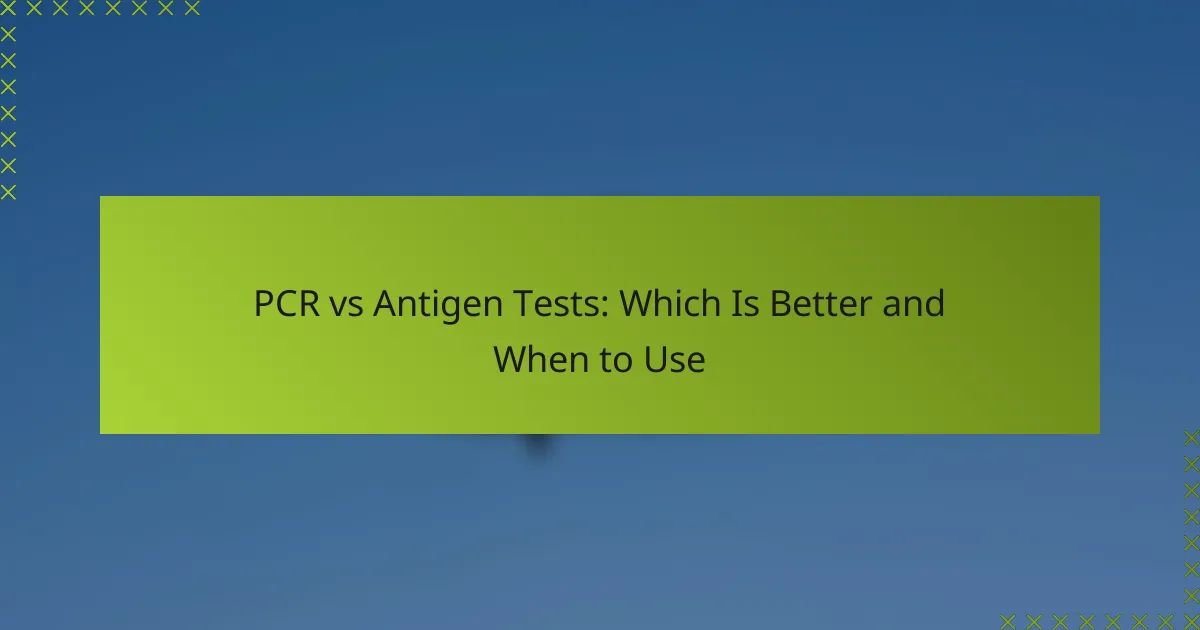When it comes to COVID-19 testing, understanding the differences between PCR and antigen tests is crucial for making informed decisions. PCR tests are known for their high accuracy and reliability, making them ideal for diagnosing active infections, particularly in symptomatic individuals or for travel purposes. In contrast, antigen tests offer rapid results and are best suited for quick screenings, especially in urgent situations like large gatherings.
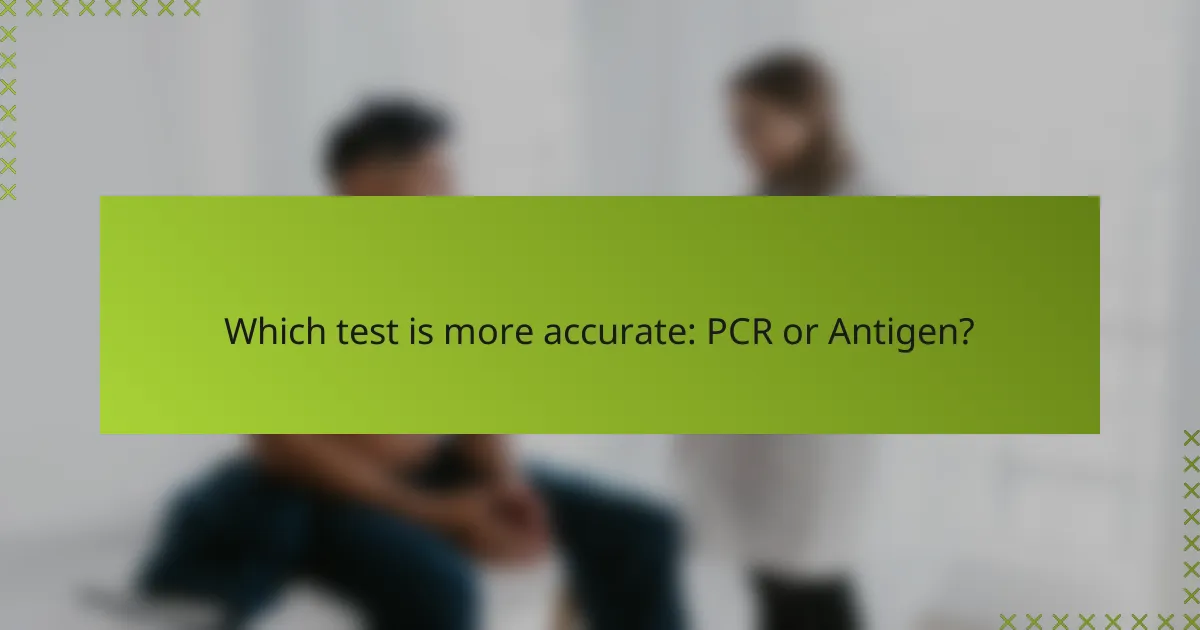
Which test is more accurate: PCR or Antigen?
PCR tests are generally more accurate than antigen tests, particularly in detecting active infections. While PCR tests can identify the virus even at low levels, antigen tests may miss cases, especially in individuals with lower viral loads.
PCR tests offer higher sensitivity
PCR tests are known for their high sensitivity, meaning they can detect even small amounts of viral genetic material. This makes them particularly effective in identifying infections in asymptomatic individuals or those in the early stages of illness.
The increased sensitivity of PCR tests reduces the likelihood of false negatives, which is crucial for controlling the spread of the virus. For example, a PCR test can reliably detect the virus in a sample where an antigen test might fail.
Antigen tests provide rapid results
Antigen tests are designed to deliver results quickly, often within 15 to 30 minutes. This speed makes them a convenient option for on-site testing in various settings, such as schools and events.
While they are faster, antigen tests are less sensitive than PCR tests. Therefore, a negative result from an antigen test may require confirmation with a PCR test, especially if symptoms are present or exposure to a confirmed case has occurred.
PCR tests are preferred for travel requirements
Many countries require a negative PCR test for entry, making it the preferred choice for travelers. These tests are often seen as the gold standard due to their accuracy and reliability.
Travelers should check specific entry requirements for their destination, as regulations can vary widely. In some cases, a negative antigen test may be accepted, but PCR tests are generally recommended for international travel to avoid complications.
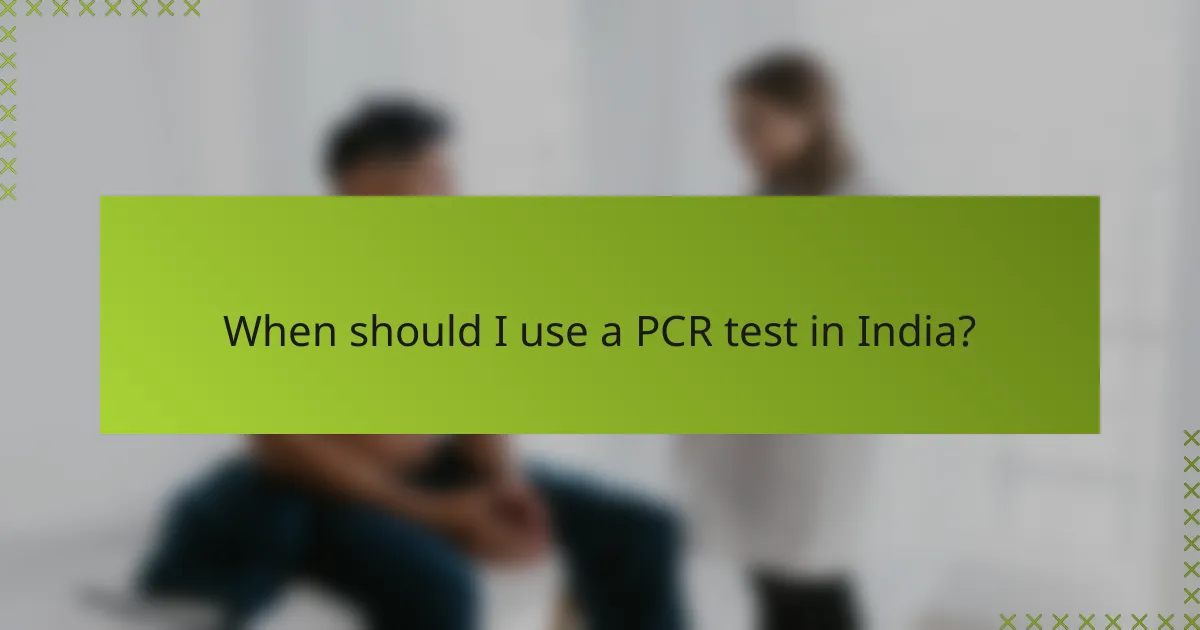
When should I use a PCR test in India?
A PCR test should be used in India when you need a reliable diagnosis of COVID-19, especially if you exhibit symptoms or require testing for travel. This test is known for its accuracy and is often the preferred method for confirming active infections.
Use PCR for symptomatic individuals
If you are experiencing symptoms such as fever, cough, or loss of taste, a PCR test is advisable. It can detect the virus even in the early stages of infection, providing a definitive result. This is crucial for timely treatment and preventing further transmission.
Symptoms can vary widely, so if you have any concerns, getting tested promptly can help you and those around you stay safe. Consider consulting a healthcare professional for guidance on testing locations and procedures.
Use PCR for travel and event requirements
Many travel destinations and events in India require a negative PCR test result taken within a specific timeframe, often 48 to 72 hours before departure or entry. Ensure you check the specific requirements of your destination or event organizer to avoid complications.
Booking your PCR test in advance is recommended, as processing times can vary. Keep in mind that while PCR tests are more expensive than antigen tests, their reliability is often necessary for fulfilling travel and event protocols.
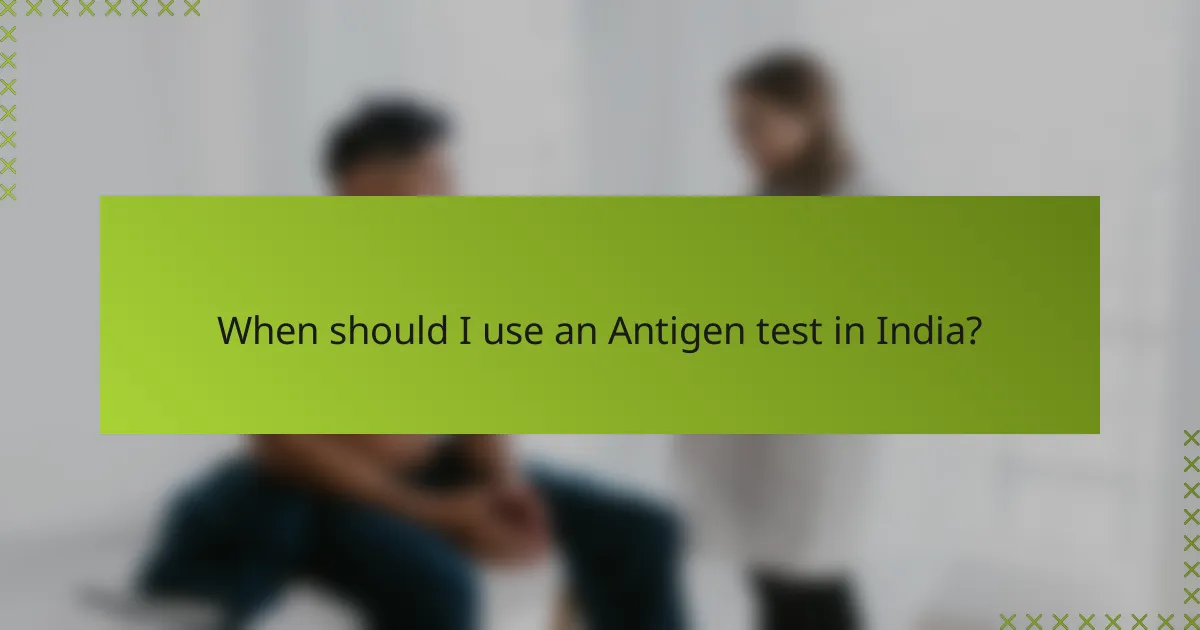
When should I use an Antigen test in India?
An Antigen test in India is best used for rapid screening, particularly when quick results are needed. These tests are effective for detecting active COVID-19 infections, especially in situations where immediate decisions are necessary, such as travel or large gatherings.
Use Antigen for quick screening
Antigen tests provide results in a matter of minutes, making them ideal for quick screening scenarios. For instance, if you need to test a large group of people before an event, an Antigen test can efficiently identify positive cases without significant delays.
However, keep in mind that while these tests are fast, they may not be as sensitive as PCR tests, particularly in detecting low viral loads. Therefore, a negative result should be confirmed with a PCR test if symptoms are present or if there is a high risk of exposure.
Use Antigen for asymptomatic individuals
Antigen tests are particularly useful for screening asymptomatic individuals, as they can help identify potential carriers of the virus who may not show symptoms. This is crucial in controlling outbreaks, especially in settings like workplaces or schools.
When using Antigen tests for asymptomatic individuals, consider the context and prevalence of COVID-19 in your area. In regions with low transmission rates, these tests can be a practical choice, but in high-risk areas, confirmatory PCR testing may still be advisable for accuracy.
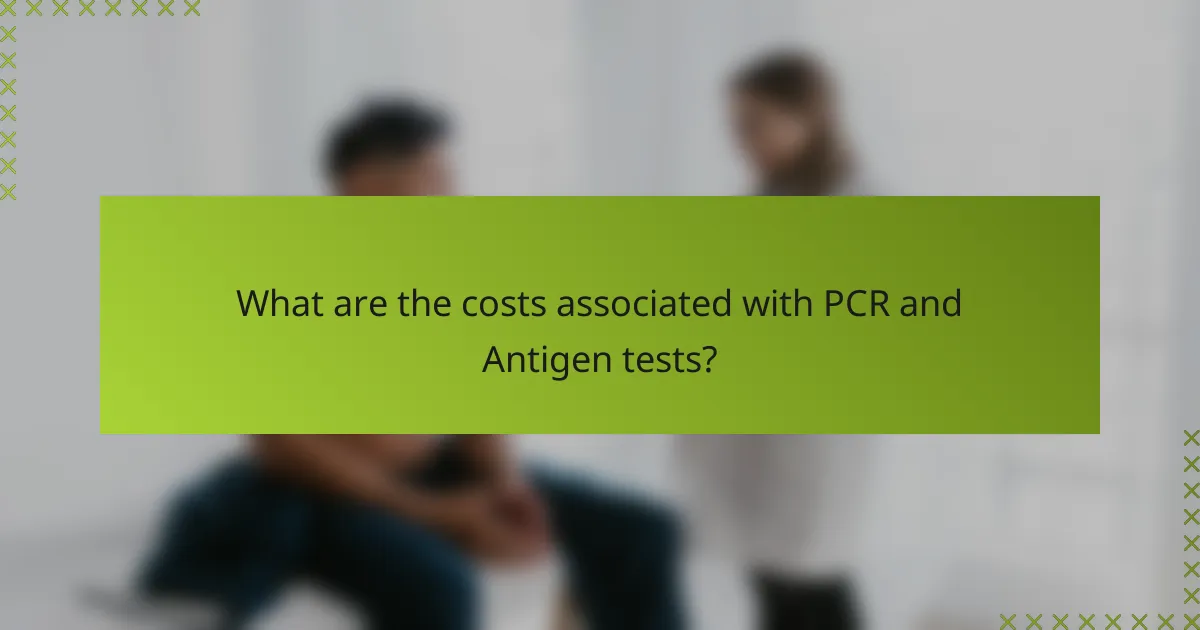
What are the costs associated with PCR and Antigen tests?
The costs of PCR and antigen tests vary significantly, impacting which test individuals choose based on their needs and circumstances. Generally, PCR tests are more expensive, while antigen tests offer a more budget-friendly option.
PCR tests are generally more expensive
PCR tests typically range from $100 to $300, depending on the provider and location. These tests require specialized equipment and laboratory analysis, contributing to their higher cost.
Insurance coverage can vary, with some plans covering PCR tests fully while others may require a copayment. It’s advisable to check with your insurance provider to understand your potential out-of-pocket expenses.
Antigen tests are more affordable
Antigen tests usually cost between $20 and $100, making them a more accessible option for many individuals. These tests can often be purchased over-the-counter at pharmacies or online, allowing for convenient access.
While antigen tests are cheaper, they may not be as accurate as PCR tests, especially in asymptomatic cases. Consider the context of use, such as travel requirements or symptomatic testing, when choosing between the two.
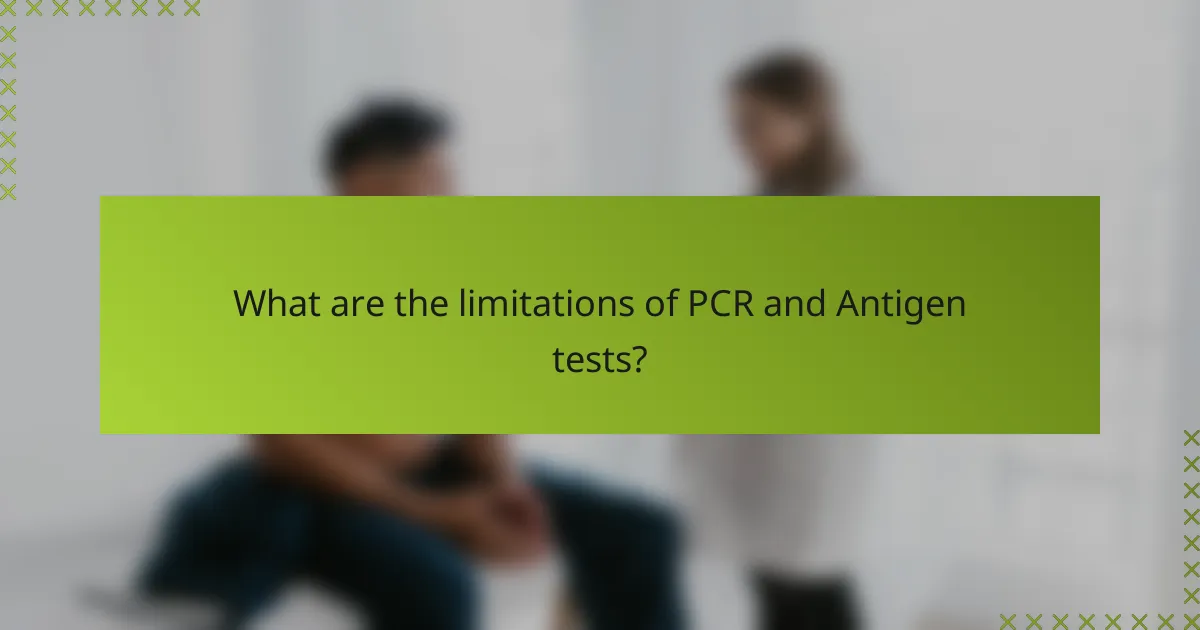
What are the limitations of PCR and Antigen tests?
PCR and antigen tests each have specific limitations that affect their reliability and timing. Understanding these constraints is crucial for choosing the appropriate test based on the situation and urgency.
PCR tests require laboratory processing time
PCR tests involve collecting a sample, which is then sent to a laboratory for analysis. This process typically takes several hours to a few days, depending on the lab’s workload and testing capacity. As a result, PCR tests may not be suitable for situations requiring immediate results.
In urgent scenarios, such as travel or large events, the delay in receiving PCR results can hinder timely decision-making. It is advisable to plan ahead and consider alternative testing options if quick results are necessary.
Antigen tests may produce false negatives
Antigen tests are generally quicker and can provide results within minutes, but they are less sensitive than PCR tests. This means they may produce false negatives, especially in individuals with low viral loads or early-stage infections. It is essential to interpret negative results cautiously.
For individuals exhibiting symptoms or those who have been exposed to a confirmed case, a follow-up PCR test is recommended to confirm a negative antigen result. Always consider the context of testing and consult health guidelines for best practices.
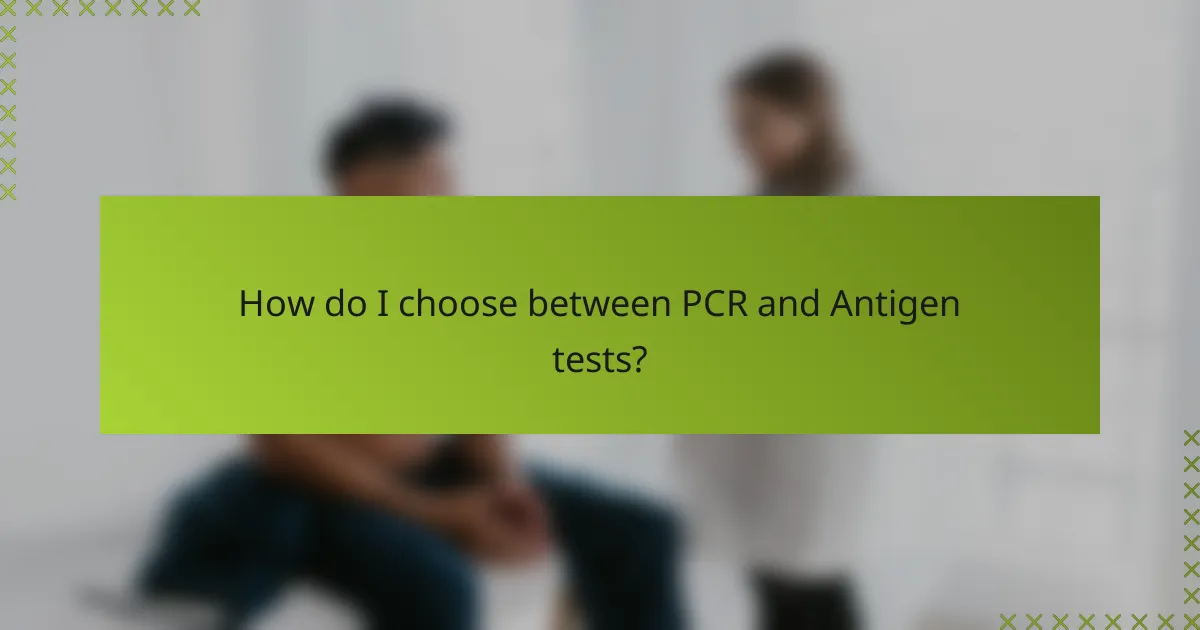
How do I choose between PCR and Antigen tests?
Choosing between PCR and Antigen tests depends on the urgency of results and the specific purpose of testing. PCR tests are more accurate and suitable for confirming active infections, while Antigen tests provide quicker results, making them ideal for screening purposes.
Consider urgency and purpose of testing
The urgency of testing often dictates which method to use. If immediate results are needed, such as for travel or events, Antigen tests can deliver results in as little as 15-30 minutes. In contrast, PCR tests typically take several hours to a few days for results but are more reliable for diagnosing active infections.
For clinical settings or when confirming a COVID-19 infection, PCR tests are preferred due to their higher sensitivity. Antigen tests are more suitable for routine screening or when rapid results are essential, even if they may miss some positive cases.
Evaluate availability and cost factors
Availability and cost can significantly influence your choice between PCR and Antigen tests. Antigen tests are often less expensive and more widely available, especially in pharmacies and clinics, costing typically between $10 to $50. PCR tests, while more accurate, can range from $100 to $200 depending on the location and laboratory fees.
Consider local regulations and insurance coverage as well. Some health insurance plans may cover PCR tests but not Antigen tests, affecting out-of-pocket expenses. Always check with local health authorities for the most current testing options and pricing in your area.

What are the latest advancements in COVID-19 testing?
The latest advancements in COVID-19 testing include the development of more rapid and accurate testing methods, particularly in PCR and antigen tests. These innovations aim to improve detection speed, reduce costs, and enhance accessibility for various populations.
Emerging rapid PCR technologies
Emerging rapid PCR technologies are designed to provide results in a fraction of the time compared to traditional PCR methods. These advancements can deliver results within 30 minutes to a few hours, making them suitable for settings like airports and large events where quick turnaround is essential.
These rapid tests often utilize streamlined processes and improved reagents to enhance sensitivity and specificity. For example, some new devices are portable and user-friendly, allowing for on-site testing without the need for extensive laboratory infrastructure.
When considering rapid PCR tests, it’s important to evaluate their regulatory approval status, as not all rapid tests meet the same standards. Look for tests that have received Emergency Use Authorization (EUA) from relevant health authorities to ensure reliability.
